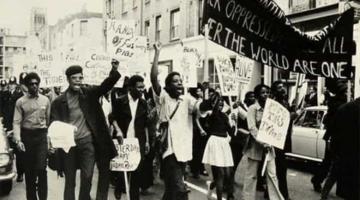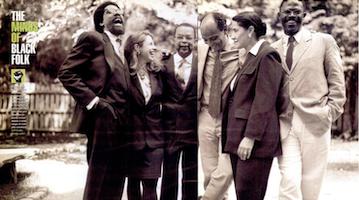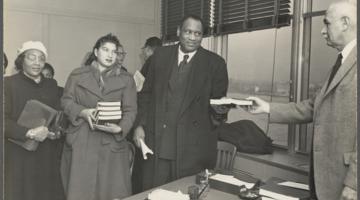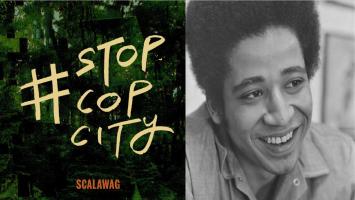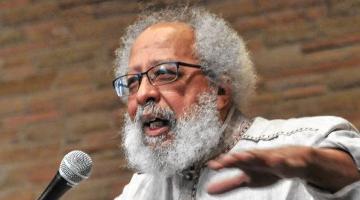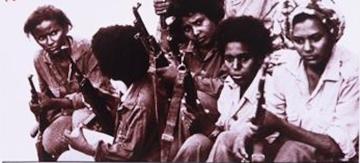Photo by Akindele (Edward Bailey).
A 1975 “Declaration Against Imperialism” provides a blueprint for the anti-imperialist Black Studies of the future.
From January 10-12, 1975, Black students, teachers, writers, workers, and activists met at Fisk University and proposed a radical re-orientation of the project of Black Studies—a reorientation demanding the serious and focused attention to US imperialism. They had come to Nashville for the National Planning Conference of the Year to Pull the Covers Off Imperialism, and both the conference, and the “Year to Pull the Covers off Imperialism” itself, were spearheaded by People’s College and Fisk’s African American Studies Program.
Participants in the Nashville conference hailed from across the US, representing a host of US colleges and universities, and a range of Black movement organizations, including the February First Movement, Black Economic Research Center, African Information Service, Association of Black Psychologists, African Heritage Studies Association, National Conference of Black Political Scientists, African Liberation Support Committee, A. Philip Randolph Institute, African Association for Black Studies, and the Association for the Study of Behavioral Sciences.
Over the days of the conference, attendees heard addresses from St. Clair Drake, then at Stanford University, Abul Alkalimat of People’s College and Fisk University, and Bill Epton, the Black Maoist and one time member of the Progressive Labor Party. Workshop presenters included philosopher Lucius Outlaw of Fisk, Dorothy Stewart of Tennessee State University, Robert Newby of Wayne State University, Ron Bailey of Peoples College, Alex Willingham of Atlanta University, and James Turner of Cornell’s African American Studies department and the African Heritage Studies Association. There were sessions on Black Intellectuals and the Black Liberation Movement, on US imperialism in Africa, on socialism, and on the role of publications in the Black liberation movement, the latter panel featuring Robert Browne of the Review of Black Political Economy, Jerry Walker of African World, and Robert Allen of The Black Scholar.
In the final session, participants discussed the “practical steps to implement the general program of the Year to Pull the Covers Off Imperialism.” As a conference report published in The Black Scholar described, they focused on a number of key areas for future work:
- Development of model anti-imperialist study outlines (e.g. for use as college course outlines) in the areas of: (A) Introduction to Black Studies; (B) Political Economy of black people; (C) The Arts and Humanities of black people; (D) 20th Century black liberation struggle.
- Support for the Declaration Against Imperialism: (A) Reprinting and distributing it wherever and whenever possible; (B) Obtaining endorsements from organizations, publications and individuals; (C) Using it as the basis for planning programs and activities.
- Reorientation of our work style: (A) Research and dissertation topics related to imperialism and black people; (B) Involvement in the black liberation movement; (C) Support for the rising anti-imperialist student movement.”
Participants also fleshed out and adopted a remarkable document, titled “A Declaration Against Imperialism.” Historically, the Declaration is important as a statement of where Black Studies might have gone if it had incorporated a serious analysis of US imperialism. But it is also a blueprint of what a future anti-imperialist Black studies might look like. We reproduce the Fisk declaration below.
A Declaration Against Imperialism, adopted at the National Planning Conference, “Pull the Covers off Imperialism Project,” Fisk University, Nashville, Tennessee, January 11, 1975
Today the world is plunging headlong into crisis. The prosperity and world domination of the USA is being challenged and exposed as the center of an exploiting imperialist system. Capitalist exploitation shaped the historical experience of Black people during European colonization and chattel slavery.
Today capitalism is in the imperialist stage of monopoly control by international financial institutions and multinational corporations. Consideration of both of these stages of capitalist exploitation pinpoints the underlying target of the Black liberation movement over the last century of struggle.
Once again it is time for Black intellectuals to speak out - to raise our voices in a rising chorus that lays bare the true character of U.S. imperialism, and unites our work with the movement for Black liberation.
Imperialism is a system that is based on intense economic exploitation, national and racial oppression, and political repression. One of the tools for maintaining imperialism is cultural domination through control of education institutions and mass media.
The development of the world imperialist system has led to a general crisis affecting all aspects of society, leaving no nation, country, or people free of its destructive impact. However, imperialism, though dangerous, is a dying system, for where there is exploitation and oppression there is resistance and struggle. People are fighting for economic security, overall improvement of their living standards, freedom, justice, and equality which ultimately requires a new social order. This is the trend of world history, and Black people in the USA are no exception. Countries want independence, nations want liberation and people want revolution.
As the USA moves toward the Bicentennial Celebration of its existence it is the historical responsibility of Black intellectuals to prevent distortions, lies and deceptions by exposing U.S. imperialism. Over 100 years ago (on July 4, 1852 in Rochester, New York) Frederick Douglass set the pace when he clearly exposed “the great sin and shame of America”:
“What to the American slave is your Fourth of July? I answer, a day that reveals to him more than all other days of the year, the gross injustice and cruelty to which he is the constant victim. To him your celebration is a sham; your boasted liberty an unholy license; your denunciation of tyrants, brass-fronted impudence; your shouts of liberty and equality, hollow mockery; your prayers and hymns; your sermons and thanksgiving, with all your religious parade and solemnity, are to him mere bombast, fraud, deception, impiety and hypocrisy–a thin veil to cover up crimes which would disgrace a nation of savages. There is not a nation of the earth guilty of practices more shocking and bloody than are the people of these United States at this very hour.”
The exposure and defeat of the “revolting barbarity and shameless hypocrisy” of US imperialism in all its forms must be adopted today as the main objectives of the historical task of Black intellectuals.
The economic crisis of the world capitalist system is intensifying, and adds up to an all-sided attack on the living standards of the people in the USA, especially the working class and oppressed peoples– Blacks, Puerto Ricans, Chicanos, Asians, and Native Americans. Our task is to expose the essence of this crisis by demonstrating who benefits from imperialism and who is exploited by imperialism – how and why, and how all the reforms now under discussion have historically failed, such as during the Great Depression, to be more than short term measures that deal with symptoms of the economic crisis and not its fundamental cause.
One of the main manifestations of the world character of imperialism is the striking of the US ruling class for hegemony in every region of the world. The US Government and corporations, aided by the foundations, universities and mass media, have extended to all corners of the globe so that the sun never sets on US imperialism. But just as when that description was applied to the British empire and was ended by the forces of national liberation after WWII, so the forces of liberation and revolution are bringing down US imperialism as demonstrated by the victorious war won by the heroic Vietnamese people and the defeat of US-backed Portuguese Colonialism in Africa. Our struggles in the USA have also been blows against imperialism, like the struggle at Attica, the Oneita Textile Strike and the struggle at Wounded Knee. The role of Black intellectuals, literally located within the belly of US monopoly capitalism is to turn the character of US imperialism inside out, pulling off the covers that conceal it, and attacking it on its ideological front.
As the Black liberation movement spreads and reflects the revolutionary aspirations of the masses of Black people, there also develops a great need for politically relevant Black intellectuals. This is a crucial mandate for all students, teachers, journalists, professionals, artists, and writers. But a Black intellectual cannot be defined simply by an occupational role or by formal education. Black intellectuals who will make meaningful contributions to the fight against imperialism are people who have developed adequate theoretical skill grounded in a critical social analysis of the oppression of Black people and US imperialism, are able to sum up the concrete conditions of a problem by discovering the logical patterns and main aspects of the problem; integrate this summation with established revolutionary principles, and creatively apply the lessons learned to contribute to solving the problem that Black people face and which exist for the entire society. Examples of this commitment include W.E.B. Du Bois, Langston Hughes, Paul Robeson, Malcolm X, and Oliver Cox.
Moreover, our theory must not only be rooted in a scientific approach to understanding the complex nature of U.S, society, and the historical development of U.S. imperialism, but also in a commitment to use such theory as a weapon in the struggle against imperialism. This includes refuting the theories of racial inferiority being put forward by professors in major U.S. universities, the intellectual justifications for anti-people programs constituting “benign neglect” and the educational programs that slow down the intellectual advancement of the masses of people.
Therefore, Black intellectuals must organize ourselves together and forge unity around our common historical condition, and the intellectual, moral, and political imperatives for our work:
WE DECLARE that a primary task of Black intellectuals today is to study the character and historical development of US, imperialism, especially its impact on Black people, and to promote this study throughout schools, publications, conferences, and organizations.
WE DECLARE that the main objective of our study must be to expose the essence of imperialism and provide the intellectual tools necessary for combating every imperialist assault on the people;
WE DECLARE that our immediate goal is to establish a new unity between Black intellectuals and the Black liberation movement in which intellectuals function to serve the interests of the people with humility based on compassion, strength, based on science, and revolutionary optimism that the people will triumph over all enemies and prosper.
FURTHER THE ANALYSIS THROUGH STUDY AND HEIGHTEN THE CONTRADICTION THROUGH STRUGGLE!!
A DECLARATION AGAINST IMPERIALISM Adopted at the National Planning Conference PULL THE COVERS OFF IMPERIALISM PROJECT Fish University, Nashville, Tenn January 11, 1975.
Additional documents and photographs from the National Planning Conference for the Year to Pull the Covers of Imperialism Project are available at Professor Abdul Alkalimat’s website.


